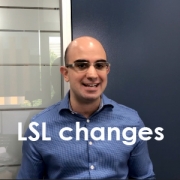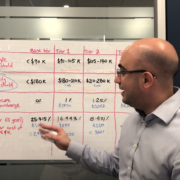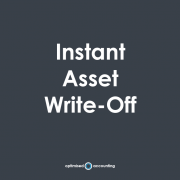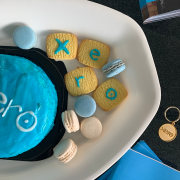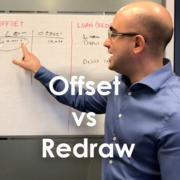Shaun Farrugia has put together a video to explain the Government’s proposed Coronavirus Stimulus Package for business owners.
Today I’m going to give you some information on the government’s economic stimulus response to the Covid-19 pandemic. It’s important to note with these measures that they haven’t passed through Parliament yet. This is due to happen in the week beginning of the 23rd of March. However, it’s unlikely that there is going to be any opposition. These measures have been designed and aimed to support the economy during this health crisis.
Instant Asset Write-Off
The Instant Asset Write-Off has been increased from $30K to $150K. This applies to pretty much all businesses and will apply to the 30th of June 2020. What this means is that if you buy an asset that’s eligible and it’s installed and ready for use by the end of the financial year, 30th of June 2020 you’ll be able to claim an immediate tax deduction in full in the current year’s tax return.
It’s important to note that this is not a cash rebate. It’s a tax deduction, so if you were to buy an asset up to that maximum threshold of $150K and you were a company taxpayer, you would get a cash benefit of 41,250.00. So it’s 27.5% of the value of it. It is important to note that as it can be a little bit confusing. Also, luxury car rules do apply, so you can’t go buy a $100K car and expect that it will be written off straight away. So any cars that are under $57,581.00 will be able to be written off straight away against your taxable income. If you buy a car that’s over, then it’ll be just that an amount that’s written off and the rest of it will be carried forward as normal. The other thing to keep in mind is if you are renovating or fitting out a building or a shop, a lot of the costs associated with the fit out are not eligible for these measures, especially if they’re part of the structural elements.
15 month investment incentive
For assets under 150,000.00 bought before 30th of June 2020, so in the next few months. This is largely irrelevant. Where it is relevant is if you buy an asset above 150,000.00 between now and the end of June, or if you buy any asset up to an unlimited value between the 1st of July 2020 and 30th of June 2021. Now what this will mean is that 50% of the cost of the asset will be able to be deducted in the first year. So if you buy a $100,000.00 piece of machinery, 50,000.00 will go against your taxable income in the year that you buy it, and then normal depreciation rules will apply for the remaining 50% after that time. Once again, it’s important to note the normal depreciation rules apply, so no fixtures and feeding costs, luxury car limit applies, as well as the fact that this is not a tax rebate, it is a deduction.
$25K tax free incentive
The third, and probably the most beneficial one to small to medium employers, is the $25,000.00 tax-free incentive that’s being offered to employer clients. Now, the way that this will work is that if you are withholding, it’s all based on how much tax you withhold from employee salaries. So if you’re withholding above $50,000.00 from your employees in the six month period from the first January to 30th of June, then you’ll get the full $25,000.00 rebate. How this will be enacted is that once you lodge your March and your June BAS, up to 50% of what’s reported as the PAYG withholding will be credited to your integrated client account. So the ATO isn’t going to be depositing money into your bank account. What it’s going to be doing is reducing the amount you need to pay on your BAS. It is important to note that this 25,000.00 is one off. So if you’re withholding more than 50,000.00 in both the March and the June quarter, you will only get it once, and if you do withhold less than that amount then the amount will be proportional. So for example, if you withhold over the six months, only in say $10,000.00 from your staff, you will get a $5,000.00 credit. The aim for this is to provide liquidity to businesses and to help them, you know, to survive the crisis without having to lay-off employees or to otherwise downsides.
Tax free payment of $750
This is more of a personal measure rather than a business measure.
This $750.00 I will be paid to pretty much any Centrelink income support recipient. So this is a new start allowance, age pension, and including even things like family tax benefits Part A and Part B. It is important to note that if you are eligible for more than one of these payments that you do only receive the $750.00 once.
Wage subsidies for apprentices
The next one is wage subsidies to support the retention of apprentices and trainers. So this will apply for businesses that have less than 20 full-time equivalent employees. And what the government is proposing here is that they will provide up to a 50% cash rebate to employers that are keeping apprentices in work. This will be capped at up to $21,000.00 per employee. So roughly on a salary of 42K a year and this is transferable.
So if an apprentice does need to be laid-off and if you can pick them up and get them working in your business, you’ll be eligible for the remaining amount of that incentive. Details on how to access these are not yet finalised and we’re expecting information on this to come out soon in early April.
Administrative measures from ATO
Apart from that, there are a few other kind of administrative measures at the ATO are allowing. So as far as the administrative measures, these are not law changes. This is just the way that the ATO will apply their discretion on certain items. First of all, anyone that is affected by Covid-19 at can apply for a lodgement deferral. What this means if you are sick, you’re unable to attend to your tax obligations, then you can apply for a deferral to minimise any kind of penalties. The ATO are likely to be a lot more lenient on payment arrangements as well if they are required and they also are going to be looking at interest remissions.
So what that means if you are affected by the Covid-19 pandemic and you’re unable to pay your tax, then you are likely to get a longer payment arrangement and possibly in a more favourable interest rate. It is important to note here that even though there will be a lot of businesses that are eligible for these concessions, it’s not always wise to take them up if they’re not required. And the reason is, is you are going to be creating potentially a lodgement and a debt snowball for an obligation that still does need to be paid. So if you are able to make payment into lodge, we do encourage that you do do this on time and you know obviously if you do need the assistance then it is there for the taking. We will work with you in implementing these as required. Just reach out, let us know and we’ll discuss what the best option is for you.
What about Superannuation?
One thing to keep in mind that I have seen in the media is that it’s okay to not pay your employees superannuation during this crisis and there are extensions.
This is completely untrue.
There are no concessions on paying your employer obligations. What this is going to mean is that your January to March, super guarantee payment that is ordinarily due by the 28th of April still must be paid on time in full. And any super that is payable from April to June, that super will be due by the 28th of July at the latest. There aren’t any concessions here, I can’t stress that enough.
If there are any changes to the stimulus measures or any new ones are announced, we will be sure to let you know.
In the meantime, reach out if you do need anything or have any questions, and stay safe.
Let’s stay in touch
Sign up to our monthly newsletter to receive articles like this as well as due dates, news, tax tips and other important things that we think are useful and interesting.
